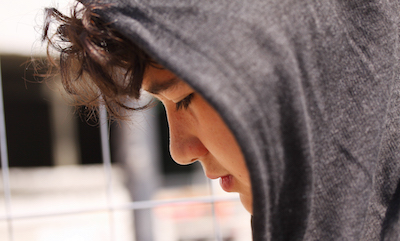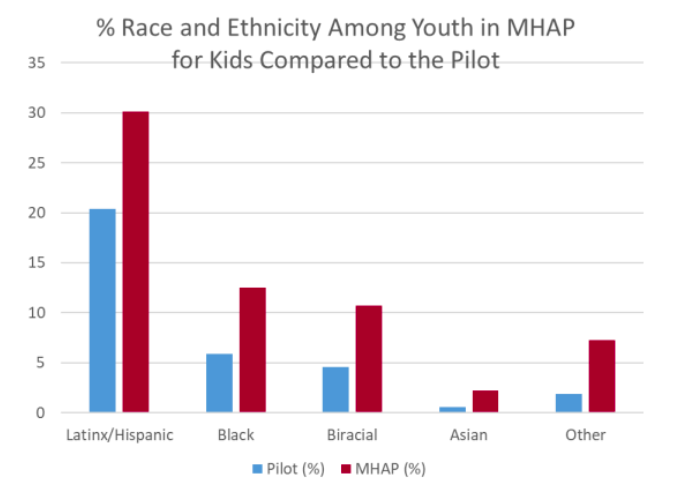Youth Mental Health Access during COVID-19.
 The coronavirus closed schools, contracted the economy, and is disproportionally devastating communities of color. In this pandemic and its aftermath, helping youths with mental health issues navigate decentralized services and stay out of the juvenile justice system may be more critical than ever, according to a new whitepaper co-authored by a School of Public Health researcher.
The coronavirus closed schools, contracted the economy, and is disproportionally devastating communities of color. In this pandemic and its aftermath, helping youths with mental health issues navigate decentralized services and stay out of the juvenile justice system may be more critical than ever, according to a new whitepaper co-authored by a School of Public Health researcher.
The paper outlines the work of the Health Law Advocates’ Mental Health Advocacy Program for Kids (MHAP for Kids) before and during COVID-19, and was highlighted at the Spring Meeting of the American Bar Association Commission on Homelessness and Poverty on June 6 as a model for best practice locally and nationally.
“Youth with unmet mental health needs including depression, anxiety, and trauma disproportionally end up in the court system, and MHAP for Kids has great potential to divert youth from court and help them get needed mental health services,” says Patricia Elliott, clinical assistant professor of community health sciences and the paper’s co-author with MHAP for Kids director Marisol Garcia.
“This is even more important now as the pandemic exacerbates existing conditions and introduces new stressors for families,” Elliott says.
In the paper, Elliott and Garcia outline the work of the program and how it has adapted for the new challenges of the COVID (and post-COVID) era.
“A fundamental reason why youth mental health services are difficult to access for families is that numerous different systems are supposed to provide such services. These systems include schools, clinicians, health insurance, state agencies, and the juvenile justice system,” they write.
MHAP for Kids provides free legal services and other help navigating and accessing these services for youth in income-eligible households in seven Massachusetts counties: Bristol, Essex, Hampden, Middlesex, Norfolk, Suffolk, and Worcester.
Elliott has been leading an independent evaluation of the program since it launched in two juvenile courts in 2015. In a paper published in 2017, Elliott and Emily Feinberg, associate professor of community health sciences, found that, out of 49 cases of youth court involvement for delinquency charges, the program avoided or shortened pre-trial detention for 16 youths, avoided adjudication due to competency concerns for 5, reduced sentences for 3, got treatment instead of detention for 1, and avoided Care and Protection cases for 12 youths by securing needed services. Elliott and Feinberg also recorded numerous other positive effects of the program, including reductions in conflict between youths and parents, less use of emergency mental health services, fewer inpatient hospitalizations or stays in emergency hospitals, increases in school attendance, and improved (parent-rated) mental health of youths and parents.
But in that 2017 evaluation, Elliott and Feinberg also found that 94 percent of the families served by MHAP for Kids reported experiencing challenges accessing mental health services for their children.
Now, COVID-19 is creating “new and more intensive barriers,” Elliott and Garcia write in the new paper.
These include school closures, which have interrupted specialized instruction and school-based counseling, while limited internet access and language barriers have made remote learning difficult for many families served by MHAP. All of these factors likely contribute to the worsening mental health of youths working with MHAP attorneys, and could have lifelong repercussions as these youths fall behind in education, Elliott and Garcia write.
To take on these issues, MHAP for Kids staff attorneys created a toolkit for other attorneys working with youth to advocate for their mental health needs during COVID, including sample letters and English- and Spanish-language forms for families to record issues. The American Bar Association Children’s Rights Committee has published the toolkit, available here.

Elliott and Garcia also outline how MHAP for Kids has adapted to better take on issues related to youths spending more time at home, economic challenges, and widening racial disparities during the pandemic. Much of this work was already underway before COVID, including efforts to help more youths of color—who are at particular risk for the “cradle to prison pipeline,” they write—and to place MHAP for Kids attorneys in counties with more low-income families. “Not by coincidence, the communities prioritized for assistance by MHAP for Kids using this approach have also been among the hardest hit by the pandemic,” the authors write.
“Having the program selected by the American Bar Association was a big honor,” Elliott says. “The results of the pilot evaluation were influential to the expansion of the program from two to seven counties within Massachusetts, and now we look forward to sharing the results of our current round of evaluation as more communities across the commonwealth and the country consider replication of the model to support youth and families.”